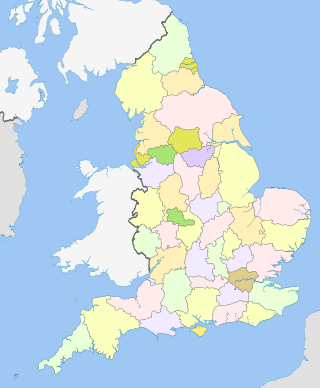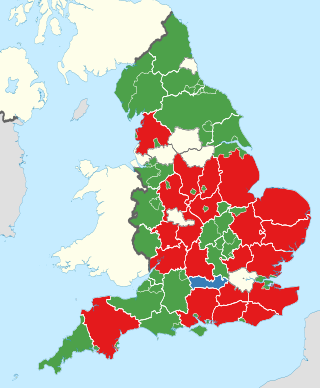
Metropolitan counties are a subdivision of England which were originally used for local government. There are six metropolitan counties: Greater Manchester, Merseyside, South Yorkshire, Tyne and Wear, West Midlands and West Yorkshire.

The historic counties of England are areas that were established for administration by the Normans, in many cases based on earlier kingdoms and shires created by the Angles, Saxons, Jutes, Celts and others. They are alternatively known as ancient counties, traditional counties, former counties or simply as counties. In the centuries that followed their establishment, as well as their administrative function, the counties also helped define local culture and identity. This role continued even after the counties ceased to be used for administration after the creation of administrative counties in 1889, which were themselves amended by further local government reforms in the years following.

The counties of England are a type of subdivision of England. Counties have been used as administrative areas in England since Anglo-Saxon times. There are three definitions of county in England: the 48 ceremonial counties used for the purposes of lieutenancy; the 84 metropolitan and non-metropolitan counties for local government; and the 39 historic counties which were used for administration until 1974.

The Association of British Counties (ABC) is a non-party-political society formed in 1989 by television personality Russell Grant to promote the historic counties of the United Kingdom. It argues that the historic counties are an important part of Britain's cultural heritage and as such should be preserved and promoted. It also proposes that there be a clear official distinction between the historic counties and the administrative units known as counties—first described as a separate entity in the Local Government Act 1888.

The regional chambers of England were a group of indirectly elected regional bodies that were created by the provisions of the Regional Development Agencies Act 1998. There were eight regional chambers, one for each of the regions of England except Greater London, which had opted for an elected mayor and assembly in 1998. All eight regional chambers had adopted the title "regional assembly" or "assembly" as part of their name, though this was not an official status in law. The chambers were abolished over a two-year period between 31 March 2008 and 31 March 2010 and some of their functions were assumed by newly established local authority leaders' boards.

The Redcliffe-Maud Report was published in 1969 by the Royal Commission on Local Government in England, under the chairmanship of Lord Redcliffe-Maud. Although the commission's proposals were broadly accepted by the Labour government, they were set aside by the Conservative government elected in 1970.

The 2004 North East England devolution referendum was an all postal ballot referendum that took place on 4 November 2004 throughout North East England on whether or not to establish an elected assembly for the region. Devolution referendums in the regions of Northern England were initially proposed under provisions of the Regional Assemblies (Preparations) Act 2003. Initially, three referendums were planned, but only one took place. The votes concerned the question of devolving limited political powers from the UK Parliament to elected regional assemblies in North East England, North West England and Yorkshire and the Humber respectively. Each were initially planned to be held on 4 November 2004, but on 22 July 2004 the planned referendums in North West England and in Yorkshire and the Humber were postponed, due to concerns raised about the use of postal ballots, but the referendum in North East England was allowed to continue, particularly as it was assumed that the region held the most support for the proposed devolution.

The Local Government Act 1972 is an act of the Parliament of the United Kingdom that reformed local government in England and Wales on 1 April 1974. It was one of the most significant Acts of Parliament to be passed by the Heath Government of 1970–74.

A non-metropolitan county, or colloquially, shire county, is a subdivision of England used for local government.

Lancashire County Council is the upper-tier local authority for the non-metropolitan county of Lancashire, England. The non-metropolitan county of Lancashire is smaller than the ceremonial county, which additionally includes Blackburn with Darwen and Blackpool. The council is based in County Hall, Preston, and consists of 84 councillors.

The unitary authorities of England are a type of local authority responsible for all local government services in an area. They combine the functions of a non-metropolitan county council and a non-metropolitan district council, which elsewhere in England provide two tiers of local government.

The Local Government Commission for England was the body responsible for reviewing the structure of local government in England from 1992 to 2002. It was established under the Local Government Act 1992, replacing the Local Government Boundary Commission for England. The Commission could be ordered by the Secretary of State to undertake "structural reviews" in specified areas and recommend the creation of unitary authorities in the two-tier shire counties of England. The Commission, chaired by John Banham, conducted a review of all the non-metropolitan counties of England from 1993 to 1994, making various recommendations on their future.

The history of local government in England is one of gradual change and evolution since the Middle Ages. England has never possessed a formal written constitution, with the result that modern administration is based on precedent, and is derived from administrative powers granted to older systems, such as that of the shires.

Cheshire West and Chester is a unitary authority area with borough status in Cheshire, England. It was established on 1 April 2009 as part of the 2009 local government changes, by virtue of an order under the Local Government and Public Involvement in Health Act 2007. It superseded the boroughs of Ellesmere Port and Neston, Vale Royal and the City of Chester. The remainder of the ceremonial county of Cheshire is composed of Cheshire East, Halton and Warrington. Cheshire West and Chester has three key urban areas: Chester, Ellesmere Port and Northwich/Winsford.

The 1997 United Kingdom local elections took place on Thursday 1 May 1997 in England, and Wednesday 21 May 1997 in Northern Ireland. Elections took place for all of the English country councils, some English unitary authorities and all of the Northern Ireland districts. The local elections were held on the same day as the 1997 general election.

A combined authority (CA) is a type of local government institution introduced in England outside Greater London by the Local Democracy, Economic Development and Construction Act 2009. CAs are created voluntarily and allow a group of local authorities to pool appropriate responsibility and receive certain devolved functions from central government in order to deliver transport and economic policy more effectively over a wider area. In areas where local government is two-tier, both must participate in the combined authority.

Local transport bodies are partnerships of local authorities in England outside Greater London. There are 38 local transport bodies. They cover similar areas to local enterprise partnerships, but are not permitted to overlap each other. Decision making for major transport infrastructure spending is devolved to these bodies from the Department for Transport. They will receive funding from April 2015.

The Cities and Local Government Devolution Act 2016 is an Act of the Parliament of the United Kingdom that allows for the introduction of directly elected mayors to combined authorities in England and Wales and the devolution of housing, transport, planning and policing powers to them. The bill was introduced to the House of Lords by Baroness Williams of Trafford, the Parliamentary Under Secretary of State for Communities and Local Government, on 28 May 2015.

The 2022 United Kingdom local elections took place on Thursday 5 May 2022. These included elections for all London borough councils, and for all local authorities in Wales and Scotland. Most seats in England were last up for election in 2018 and in Scotland and Wales in 2017. The elections coincided with the 2022 Northern Ireland Assembly election. In 91 cases, most of them in Wales, council seats were uncontested, each having only one candidate. Three seats in Scotland remained unfilled as no one nominated to fill them.















